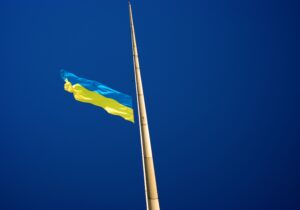Introduction: Jus Post Bellum in Ukraine
The bloodshed in Ukraine may be far from over, but cynical voices are already speaking in frosty realpolitik terms about how this war could end. Some are suggesting that we must find ways for Russia to save face, despite Putin’s aggression. Some say it just isn’t our business, and even if it was, the feckless, bumbling policies of the current tired president do not seem up to the challenge. Some even blame the West’s “provocative behavior” as the first cause of Ukraine’s suffering. Each of these viewpoints lacks a moral framing for a secure and enduring peace for Ukraine and its neighborhood. We need to be working on this long before the war ends.
Christian Realists know that by applying the fundamental principles of the just war tradition, we can derive a prudential and moral framework for practical policy proposals. More specifically, the jus post bellum (the ethics of ending war and building peace) categories of order, justice, and conciliation can help us think through many of the policy alternatives for ending a war well—from the humanitarian needs of average citizens to the need for reconstructing a new security architecture for Eastern Europe.
Classic just war thinking traditionally asked two questions: When is it right to go to war (jus ad bellum); and once war starts, how should war be fought ethically (jus in bello)? Thus, political authorities may employ force on behalf of a just cause (self-defense, justice) when acting with right intentions (neighbor-love, rights vindication). We expect political authorities to make such decisions prudentially, taking into consideration every reasonable tool of statecraft and weighing the destructiveness of force with the grievance and threats faced (criteria of likelihood of success, proportionality of ends, last resort). When the war is fought (jus in bello), battlefield actions should be fought to win within lawful boundaries (military necessity), proportionate to operational objectives (proportionality), and designed to reasonably protect non-combatant life and property (discrimination).
In recent years, several scholars have called for the expansion of just war thinking to include a late- and post-conflict ethical framework, which is called jus post bellum. There are some very practical reasons why we need this.
First, most wars are not linear, meaning they do not have a clear declaration of war date or a clear termination date. Most Americans, at least until recently, thought of war in a linear way because we could point to key dates such as December 7, 1941, or November 11, 1918, as the seminal moments for the inauguration or termination of wars. But most people around the world have not experienced war in this way, and the United States learned some hard lessons about this raw fact in the jungles of Vietnam and the deserts of the greater Middle East.
Imagine you are an adult living in Sudan or South Sudan today. Your grandparents’ generation was involved in a war. Your parents’ generation was involved in a war. Both your generation and your children’s generation have been involved in their own wars. This is what the people of Afghanistan, Congo, and many other countries around the world have experienced. There are also places, including Ukraine, where a massive threat on the border always loomed and where threats, cyber-attacks, bullying, fake news, and the exhausting vigilance caused by endemic insecurity constantly interrupted political and social life. This is why we need a thoughtful approach to secure an enduring conflict termination that is both principled and realistic.
Restoring Order at the War’s End—the First Step for Normalization
The first principle of jus post bellum is order. Order begins with existential security (meaning the killing has stopped) and a single, sovereign government is established and extends its capacity in three dimensions. These dimensions include domestic security, governance(domestic politics), and international security.[1]
How does this relate to the case of Ukraine? The first and fundamental element of order is the ability of a government to provide basic governance and services to its people. That would mean having a legitimately elected Ukrainian government led by a president and parliament. Ukrainian life has many authentic institutions, including highly visible churches and vibrant private and nonprofit sectors. A first step, when the bullets stop flying, will be to continue—not to begin—but to continue supporting the ability of government to provide basic security, governance, and services to its people. It is in the interests and the values of Ukrainian friends and neighbors to help through this time of restoring public order and services to prevent disease, famine, and an expanding refugee crisis.
Tied to the provision of basic governance and services is whether or not the government in Kyiv and the governments in the provinces at the local level face internal threats from lawless actors, criminals, or groups who refuse to pledge allegiance to Ukraine’s sovereign government. We’ve certainly seen this type of problem at the end of civil wars, where armed forces in the field within the country’s boundaries refused to acknowledge the sovereignty of the national government. We also see this problem in places with poorly secured borders and groups moving in unsecured and untamed spaces. Additionally, criminal cartels can establish organizational headquarters either in the jungle or sometimes in the open beyond the effective reach of law enforcement or the national military. Ukraine must be empowered to deal with rogue elements on its soil and prosecute them to the full extent of the laws of war.
But the security situation has to deal not only with people but also with clearing the detritus of war. We have already seen Russian personnel in Ukraine leaving booby traps and unexploded ordnance in their wake. Remember the former Yugoslavia. The remnants of war can kill civilians long after the last bullets and can create severe humanitarian hardships, such as the loss of agriculture, destruction of housing, and environmental damage of water sources.
The third element of order is the international dimension: security from assault from an outside power. At present this is almost impossible to imagine. What would it look like for Kyiv to be free and independent of Moscow, if it no longer had to worry about cyber-attacks, mercenary and criminal assaults, and future outright invasions?
But, imagine it we must. Indeed, it is clear that Ukraine’s security is enmeshed in the security of its neighbors, and that includes Russia and its allies to the East in addition to Poland, other NATO members, and several more in the West. First and foremost, the parties must be looking toward a national and international security framework that buttresses Ukraine’s security and attempts to bring its neighbors into a security compact that ensures an enduring order.
The reason that this is difficult to imagine is due to the nature of the current Russian regime’s aggression in its neighborhood, most notably in Georgia and Ukraine in recent years. The fact that Russia has chosen to act outside of internationally agreed-upon norms creates chaos and lawlessness. To be clear, when Russia bullies its neighbors, deploys mercenaries to attack sovereign countries, uses cyber-attacks and disinformation campaigns during times of peace, deploys unlawful chemical agents to assassinate political opponents in foreign countries, violates national borders, and defies the laws of armed conflict by deliberately attacking civilians—this is disorder. This is lawlessness. This is state-level criminality because it erodes the norms and safeguards of international political life.
Russia’s attack on Ukraine does not just kill individual people and create piles of rubble where once stood homes, churches, schools, and hospitals. Russia’s invasion of Ukraine undermines the fabric of international law and order. If not checked, it may make other adventurers—like China assaulting Taiwan—more likely. Hence, Western governments need to start considering just what an effective security order for Ukraine and its region looks like after Russia’s military finally retreats from Ukrainian soil.
[1] These criteria are not enshrined in historic just war thinking, but are distilled from various sources and were elaborated on in two volumes by Eric Patterson: Ethics Beyond War’s End (Washington, DC: Georgetown University Press, 2012); and Ending Wars Well: Order, Justice, and Conciliation in Post-Conflict (New Haven, CT: Yale University Press, 2012).







 Sponsor a student for Christianity & National Security 2024
Sponsor a student for Christianity & National Security 2024